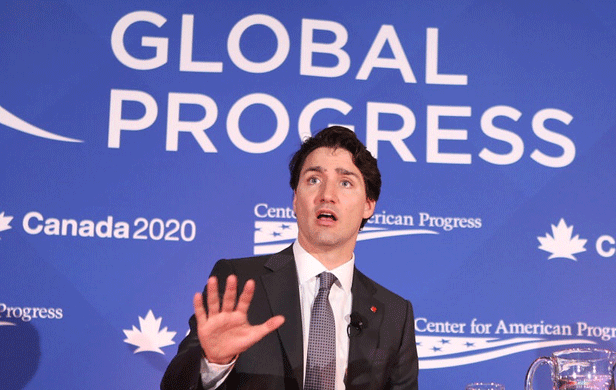
When Justin Trudeau talks of oil pipeline projects as part of an energy transition, what exactly is he talking about?
That we will be on the path to reducing our dependency on fossil fuels by increasing our oil dependency in the short term? And that by immaculate conception we will reduce these very same dependencies over the long term? Supposedly, we will switch to a green economy sometime between now and when we are all dead, with the help of Adam Smith’s “invisible hand”.
Green is the future for jobs
When the Trudeau government repeatedly indicates we can grow the economy while protecting the environment, it knows full well that it is reinforcing the myth that the resource economy is about economic development and protecting the environment represents a cost. Journalists and most of the general public, who know nothing about green economics, can identify with this myth. This, despite the fact that the green economy offers better economic development models than the traditional resource economy model in terms of job creation.
If Trudeau was serious about working on a transition now, he could pursue his stated inclinations on the international scene to re-direct Canadian subsidies for the fossil fuel industry. For example, he could encourage, among other things, the diversification of the Alberta economy, and the Western Canadian economy in general, to join the global migration to the high-job creation, high-growth, green economy.
Corporate welfare for fossil fuel sector
The International Monetary Fund has estimated that the direct and indirect subsidies for Canadian fossil fuels work out to $46 Billion/year in US 2015 dollars. Reallocating these subsidies to help Western Canada catch up in the migration to the green economy would offer a more sound path to the country’s future prosperity
The pipeline capacity numbers speak for themselves – namely that we are headed in the wrong direction. The Kinder Morgan Trans Mountain project would increase the capacity of that pipeline from 300,000 barrels/day to 890,000; Enbridge Line # 3 would be doubled to 760,000 barrels/day and Keystone XL is set for Canadian and US approvals to carry 830,000 barrels/day. Energy East has not as of yet been approved, but Trudeau has claimed that opposition to the 1.1 million barrel/day Energy East pipeline is not based on science.
Stars aligned for green economy
Science is telling us that to avoid catastrophic climate change, 80% of known fossil fuel reserves must remain in the ground. The 100 megatonne ceiling that Trudeau likes to brag about as an example of putting limits on tar sands development will increase tar sands emissions by 40%.
The time is ripe for beginning the transition because solar and wind have come down so far in cost that they are often cheaper than fossil fuels. China, the world’s largest energy consumer, has figured this out and continues to set the pace for the rest of the planet with a $361 Billion commitment to renewables in its 5 year plan for 2016 to 2020.
Shells leads way diversifying into clean tech
Somehow, it is the oil giants themselves who have come to the realization that they will have to diversify if they are to avoid being left with large volumes of “stranded assets.” Fitch Ratings have gone so far as to forewarn that the oil companies will have difficulty gaining access to capital if they do not diversify into renewables.
Shell gets it! Shell has successfully won a bid for the 630 Megawatt Borssele 3&4 zone offshore wind project off the coast of the Netherlands. Shell’s chief energy advisor claimed “the penny has now dropped that this is the new business space.” Thus Shell will be more active in offshore wind in 2017, currently eying offshore tenders in Germany and the UK. Shell is also planning to divest from the tar sands. Norway’s Statoil has already done it.
France’s Total has ambitions to be a top-three solar player within 20 years after taking over battery maker Saft and having bought out a majority share in SunPower.
Dong of Denmark is divesting from petroleum and has become the world leading investor in offshore wind with 4.4 GW of offshore wind projects presently under construction off Europe’s coasts.
Cleaner cars en route
This brings us to the matter of the transition in the transportation sector. At this point, the US automakers, such as the CEO of Ford, Mark Fields, are gearing up to tell Donald Trump that the current US automobile fuel economy standards – which incrementally become more stringent through to 2025 – will cost US jobs and raise the average cost of vehicles. But the rest of the developed world will continue to require that the industry dramatically reduce its emissions.
A Morgan Stanley report projects that electric car sales will represent 10% to 15% of vehicle sales by 2025. This is less than Volkswagen’s projection of 20% to 25% of sales for the 2020 to 2025 period but nevertheless reinforces the growing consensus that the tipping point favouring electric vehicles will come in the 2020-25 period.
In effect, Fields is conveying half of the truth. That is, the vehicle manufacturers are investing in getting more efficiency out of the internal combustion engine, something which adds to the manufacturer’s costs. But the other half of the truth is that they will reach a point where investing in electric vehicles will be the more cost effective way to reduce vehicle emissions. This is what can be appropriately called a transition, as opposed to the Trudeau version of the word, which calls for more petroleum production.
No business case for new pipelines
Stanford University’s Tony Seba predicts that the falling costs of electric vehicle technologies will contribute to oil becoming redundant by 2030. That translates into a too-short life span for tar sands pipelines to be an acceptable economic proposition.
Further on the Fields argument on the cost of change, innovation should be regarded as a normal cost of doing business because the alternative is that of no improvements and being outclassed by one’s competitors.
Improved fuel economy a good investment
The US Alliance of Automobile Manufacturers laments about the cost of improved fuel economy. It lies.
The increasing cost of new vehicles has little to do with fuel efficiency improvements and more to do with consumers buying more fully-equipped vehicles for both comfort and entertainment; the shift away from cars to the high-profit margin light duty trucks and SUVs in particular; and automakers’ increasing pursuit of the higher end luxury market.
The reality is that Canada can support a more aggressive transition to zero and low-emission vehicles with standards more stringent than those of the US federal government. In doing so, the Government of Canada could join US states and the Government of Quebec, all of which have taken a different path than that of the US federal government.
Enough of Trudeau’s greenwashing
We could agree with Trudeau’s greenwashing line that we need to engage in a transition and that we can develop the economy while protecting the environment. But the transition needs to begin now to guarantee the economy of tomorrow. To do this we need a green economic development model.


“Greenwashing”.
Good one.
Solar and wind power will become comperable alternatives in the very near future.
Perhaps a larger carbon tax on gasoline and diesel at the pumps might hasten that switch to clean energy?
I wont hold my breath that ANY politician will throw themselves on the environmental sword to “make it happen”.
There is far too much money pushing back against change
Change will happen with the people.
Not politicians that need millions of dollars to get elected or re elected.
You have just written the article I have been trying to formulate over the past months. Thank you so much!! I am certain that with or without Canada’s governments help the “100% Transition” to a Renewable Energy “Electric Powered Economy/Society/World” is happening because it makes business sense. The speed at which this Transition moves forward, with the increased JOB’s; as well as, the reduction in pulmonary Heath cases and associated costs, would be helped if Canada’s politicians could get on board.
Save our water and air for the next generation
An excellent article Will. Thank you.